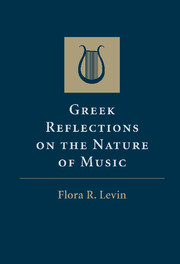Book contents
- Frontmatter
- Contents
- Figures
- Preface
- Introduction
- Abbreviations
- Texts
- 1 All Deep Things Are Song
- 2 We Are All Aristoxenians
- 3 The Discrete and the Continuous
- 4 Magnitudes and Multitudes
- 5 The Topology of Melody
- 6 Aristoxenus of Tarentum and Ptolemaïs of Cyrene
- 7 Aisthēsis and Logos: A Single Continent
- 8 The Infinite and the Infinitesimal
- ΣΦPAΓIΣ
- Bibliography
- Index
2 - We Are All Aristoxenians
Published online by Cambridge University Press: 21 October 2009
- Frontmatter
- Contents
- Figures
- Preface
- Introduction
- Abbreviations
- Texts
- 1 All Deep Things Are Song
- 2 We Are All Aristoxenians
- 3 The Discrete and the Continuous
- 4 Magnitudes and Multitudes
- 5 The Topology of Melody
- 6 Aristoxenus of Tarentum and Ptolemaïs of Cyrene
- 7 Aisthēsis and Logos: A Single Continent
- 8 The Infinite and the Infinitesimal
- ΣΦPAΓIΣ
- Bibliography
- Index
Summary
Caught in that sensual music,
All neglect monuments of
unageing intellect
W. B. Yeats, Sailing to Byzantiumhad he been as little regarded in his own day as he is today, Bacchius would surely not have had conferred upon him an epithet of good consent, if not affectionate esteem: Geron, the “Old Man.” In antiquity, certainly, as in some few segments of society now, “The Old Man,” like Der Alter, was a term reserved for persons of high repute and venerable wisdom. One would like to believe, therefore, that Bacchius was recognized by the musicians of his day for what he represented to them: a repository of ancient musical knowledge. Bacchius was, in fact, a pure logician of music, one who had nothing to do with problems pertaining to mathematics, science, or to any of the other arts. His subject-matter was music and everything pertaining solely to music. This “everything,” as he made clear, involved the most vital source of musical knowledge: melody. In this very special and restricted respect, Bacchius belonged to a tradition that was founded by Aristoxenus of Tarentum (375/360–after 320 b.c.), the most original and penetrating musical theorist of antiquity. It was to Aristoxenus' method and philosophy that Bacchius paid tribute in his Introduction to the Art of Music, down to the last detail, now and then adding material that is not to be found in the extant works of Aristoxenus himself. Following the path charted by Aristoxenus, Bacchius assembled all his musical facts from one source only: the basic truths of musical experience.
- Type
- Chapter
- Information
- Greek Reflections on the Nature of Music , pp. 48 - 87Publisher: Cambridge University PressPrint publication year: 2009

